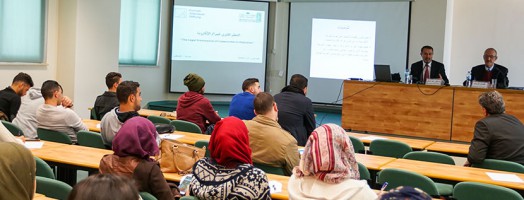The Legal Framework of Cybercrime in Palestine
Moderated by Dr. Ghassan Faramand, a staff member of the IoL, the presentation was made by Dr. Mustafa Abdul Baqi, Chairman of the Department of Law at the Faculty of Law and Public Administration. The legal encounter was held with support from Konrad Adenauer Stiftung Palestinian Territories.
In his opening statement, Dr. Faramand explained that the IoL Legal Encounters Programme shed light on contemporary and complex legal issues. Stressing the need for the consolation of laws between the West Bank and Gaza Strip, Dr. Faramand noted that the Council of Ministers was in the process of developing a decision to enact laws for the protection of electronic information. Dr. Faramand stated that the Faculty of Law and Public Administration would transmit conclusions of the legal encounter to the General Secretariat of the Council of Ministers to help approve the final version of these draft laws.
Dr. Abdul Baqi stressed the need to discuss cybercrime in light of the widespread use of the internet over the past few year. Cybercrime has increased steadily. The Cybercrime Unit of the Palestinian Police lacks many advanced IT equipment to help prosecute and arrest relevant offenders.
Laws in force in the Palestinian territory are out-dated and do not include any provisions on cybercrime. Cybercrime is defined as any offence committed using the computer or the internet. According to Council of Europe’s Convention on Cybercrime of 2001, cybercrime covers offences against the confidentiality, integrity and availability of computer data and systems. These include illegal access to private computer systems, computer-related fraud and forgery, password theft, and content-related offences. Cybercrime also includes offences related to pornography, propagation of hatred and infringements of copyright and related rights.
From a Palestinian perspective, cybercrime can be classified into traditional offences that can be resolved. On the other hand, modern offences need new legislation to counter and eliminate them. According to Dr. Abdul Baqi, cyber-extortion is the most widespread computer-related offence in Palestine.
Incrimination, more aggravated penalties, effective investigation and ability to collect criminal evidence are needed to efficiently counter cybercrime. According to Dr. Abdul Baqi, investigation comprises two main stages. After they secure and keep the crime scene intact, cybercrime investigators identify the respective computer ID, maintain evidence and digital data, and retrieve deleted documents and files.
Individual privacy is a key challenge to investigations into computer-related offences. In the aftermath of the 11 September, all states saw a clear impingement on individual privacy. The Arab Convention on Combating Information Technology Offences allows relevant authorities to access citizens’ cyberspace without prior notice, gravely violating the right to privacy. Although the Palestinian legal framework does not provide for electronic privacy, the Basic Law emphasises respect for the personal freedom of information.
In Palestine, cybercrime investigation is challenged by a legislative vacuum, which results in a declined performance of the Palestinian Police’s Cybercrime Unit. In addition, provisions of the Penal Procedure Law are not compatible with computer-related evidence collection procedures. The law does not provide how electronic evidence can be processed, seized and released.
Dr. Abdul Baqi concluded that operative Palestinian laws should be amended, including the Penal Law and Law on Wired and Wireless Communications. These legislative amendments are needed to eliminate cybercrime, which negatively impacts internal security in Palestine.
In the ensuing discussion, the audience inquired about how cybercrime was approached by international and domestic laws. They also discussed potential techniques to prosecute and put an end to cybercrime.











